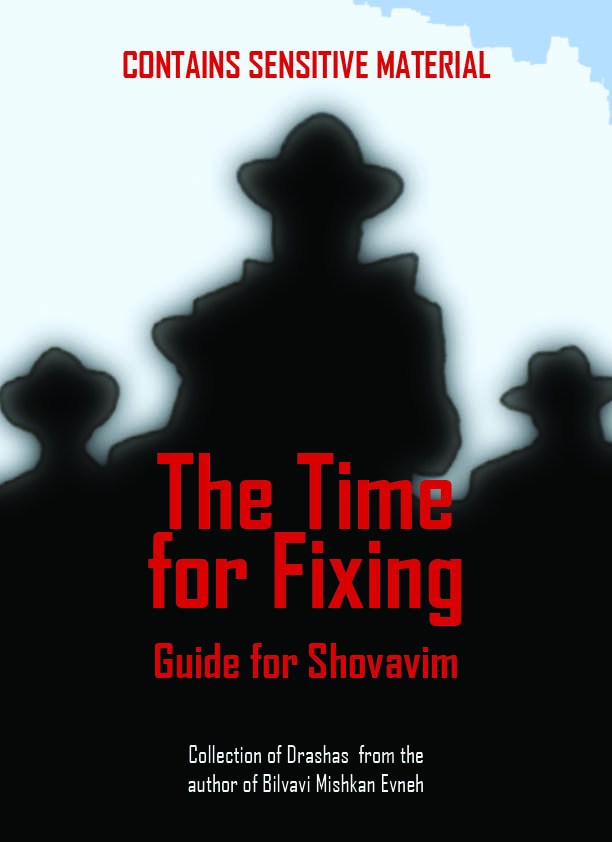- להאזנה תפילה 147 מודים לך לקב-ה ושאר נבראים
147 The Depth Behind Gratitude
- להאזנה תפילה 147 מודים לך לקב-ה ושאר נבראים
Tefillah - 147 The Depth Behind Gratitude
- 5923 reads
- Printer-friendly version
- שלח דף במייל
The Root of All Gratitude
מודים אנחנו לך – “We are thankful to You, Hashem”. At the end of the blessing we say again, “For to You it is good to give thanks to.” Hashem is also called “Keil HaHodaos”, G-d of all thanks, because all of our gratitude mainly is towards Hashem. We give thanks to Hashem, and specifically to Hashem.
We give thanks mainly to Hashem; however, we don’t only thank Hashem. It is just that thanking Hashem is the root of giving thanks. Surely we need to be grateful to others as well. But gratitude to Hashem is the root of all gratitude, whereas being thankful to others is a branch of the root gratitude.
How Far Gratitude Goes
To be more specific, we have two abilities of gratitude: hodaah (admitting to the good we have received)[1] and hakaras hatov (expressing gratitude).
Hakaras hatov is to be grateful to anything in creation you receive good from, even to a non-living organism, such as how we see that Moshe had hakaras hatov to the Nile River for saving him. Hakaras hatov is not just to thank what you have received from, but that you shouldn’t inflict damage on what you received from; as we see from the fact that Moshe didn’t want to hit the Nile River and the rock.
As long as one received good from someone, he must be grateful to that person. Yosef was grateful to the brothers even though they sold him, by telling them that it was really good that they sold him, since it ended up being Hashem’s plan that he become king of Egypt. We see from this that even when someone wants to harm you, as long as it ended up benefiting you, you must be grateful to that person.
As long as you received good from a person, you are obligated in hakaras hatov to him. And, a person needs to have hakaras hatov even to an inanimate object in Creation, as long as he received good from it. The baalei mussar explain that hakaras hatov is even towards someone who did not mean to benefit you and even to someone who wanted to harm you, with regards to the fact that you should not damage what you gained from; even if you do not have to express gratitude, you certainly must not harm that which you benefited from.
The main kind of hakaras hatov we find is to someone who did you a favor even though that person meant for his own good and not for yours. The Chovos HaLevovos (in Shaar HaBechinah) says that one must be grateful to his parents even if the parents only were kind to him for their own good.
Surely there are many times where a benefactor was good to another because he was altruistic, but most of the good which we benefit from others is not done for our own good - rather, it is usually for the personal benefit of the one who did it for us. Even so, we must still have gratitude towards anyone who benefitted us. The Chovos HaLevovos writes sharply that parents mainly do kindness for their children because they want to be loved by their child, yet even so, the child must be grateful to the parents.
Finally, the main kind of hakaras hatov which we find ourselves involved with is towards someone who intentionally does good for your own benefit. This makes the most sense to us. Whereas it is harder to be grateful to someone who did not intentionally benefit you or to someone who tried to harm you (but ended up benefitting you), it is simple and easy to be grateful to someone who intentionally benefitted us.
Gratitude Towards People: Does It Contradict Emunah In Hashem?
However, if you think about it, it is difficult to understand why we must be grateful to one who benefited us intentionally.
Why? It is because the root of all our emunah (belief in G-d) is that Hashem does everything. From the perspective of emunah, it seems that we don’t need to be grateful to any person on this world, for Hashem is really behind everything. Any person who does good for us is just a messenger of Hashem. If Shimon does good to Reuven, and Reuven has palpable emunah in Hashem, why should he thank Shimon, when he knows clearly that it is Hashem who benefitted him…?
It makes more sense to be grateful even to someone who wanted to harm you, as long as it ended up being for your good. But why must one be grateful to someone who intentionally wanted to help you, when it is clearly Hashem who gave you that good, and not the person?
The Limits of Having Emunah
Here we come to a deep point, which will answer the above question.
Every power in creation can be used for good or evil. The worst thing in creation is: kefirah (heresy). Heresy was also created by Hashem, however. So there must be a way to use it for holiness. Simply, it can be good because it enables free will; if not for heresy, we would have no free will to choose between faith and heresy. So it ends up being part of Hashem’s plan in Creation.
But our Sages revealed more to the purpose to why heresy exists. Sometimes, a person can use heresy for holiness. Here is an example. A person comes to you for tzedakah. Should you have emunah that Hashem will take care of him, and therefore you don’t have to take care of him? Of course not. Our Sages said that when a pauper comes to you for tzedakah, you must view him as one whose life depends on you. Now is not the time to have emunah in Hashem. Now, you must deny your emunah, and take care of the poor person who needs you! That’s how we use the power of ‘heresy’ for holiness.
This is just an example that brings out the concept, but the point is: when someone does good for you, you cannot view him as someone who is merely a puppet in the hands of Hashem. Although it is true that Hashem enables everything, you have to believe that your benefactor had free will, and he chose to be good to you. Therefore, you must feel grateful to him.
The Inner and Outer Dimensions of Gratitude
To describe this clearer, there are really three layers to gratitude.
There is a deep point in your soul that can feel that only Hashem gave to you, and not the person.
The middle point of your soul, however, can feel that the person who gave to you is a messenger of Hashem; that Hashem ‘garmented’ Himself through the person who gave to you.
The outer part of your soul must recognize that the other person decided to be good to you, therefore, you must be grateful to him that he chose to benefit you.
The deep point in your soul knows that there is nothing besides for Hashem. The middle level of your soul realizes that all is a garment of Hashem. The lower level of your soul, which is also to be validated, is that those who give to you are choosing to give to you, therefore you must acknowledge that a person gave to you; this part of your soul is not involved with the ‘emunah’ perspective and cannot relate to it.
How do most people act when they feel grateful? Most people will feel that a person gave to them, not Hashem. Fewer people look at their benefactors as being nothing but messengers of Hashem. And there are even fewer people who believe that only Hashem gives you all your good, and that no person on this world give you anything.
Worse than this are also people who go so far with their “emunah” that they misuse it: because they believe that everything happens because of Hashem, they deny the other two factors. They won’t ever feel grateful to other people because of this misguided kind of thinking. When emunah is misused like this, it can lead to denying the existence of another, which creates a lack of love towards others.
“Thank You…”
Thus, hodaah (gratitude) is really a subtle matter. One needs to know how to give hodaah to Hashem and to others, and he must know the proper balance between these two kinds of hodaah. It does not suffice to have one without the other.
If one thanks only people and not Hashem, he is lacking in emunah, but if he only thanks Hashem and not people, he is denying the existence of others and he will in turn have no hakaras hatov to people.
It’s hard to say exactly how much you need to thank Hashem versus how much you need to thank people. But a person needs to have a balance between the two kinds of gratitude. It depends on the spiritual level of each person as well as the unique circumstances that a person finds himself in.
The Difference Between Thanking Hashem and Thanking People
There is a fundamental difference, however, between the way we must feel when we thank Hashem, with the way we thank people.
Giving hodaah to Hashem comes from recognition of a “constant” kind of gratitude we must have, whereas thanking other people is not gratitude on a constant level; it is meant to be used only a temporary basis. The reason for this is because people are only temporary, whereas Hashem is forever. Thus, we must certainly thank people when we receive good from them, from time to time. But thanking Hashem is something we constantly need to do.
When we thank people, we recognize that the other person has chosen to do good for us, out of his own free will, and therefore we are grateful to another, for having chosen to be kind to us. Being that the power of bechirah\free will is not the deepest part of our essence, thanking other people when they do good for us is thus only to be done temporarily – at times. How do we know that bechirah is not part of our essence? Of the future, it is written that they will be “days when I have no desire” - when our bechirah\free will be removed.
Our bechirah\free will is secondary to our emunah (faith in Hashem). Emunah is the deepest part of our being. Thus, we need to make sure that our emunah is more active than our power of bechirah\free will [with regards to gratitude]. Emunah is to believe in Hashem, which is a constant belief, not something we only access temporarily. In contrast, bechirah\free will is something we recognize as a “temporary” power. Thus, thanking other people should only be done be at times, not constantly; whereas thanking Hashem should be done on a more constant basis, much more than how much we thank people.
Our bechirah\free will is borrowed for the time being, from Hashem. One day we give it back. So our free will is not the essence of our soul. The essence of our soul is emunah. Thus, our emunah must be more dominant in our life than bechirah and it must therefore be seen as the main part of our being, as opposed to our power of free will, which is only temporary and thus does not define our essence.
The Depth of Thanking Hashem
So when we give hodaah, we must thank Hashem on a more constant basis than the amount of how much we thank people. Surely we must thank people too, but only at times. The only One whom we must always be thanking is Hashem.
Chazal say that one must “praise Hashem for every breath”. We always breathe; we are always alive. For every breath we thank and praise Hashem for, because our very life is to give thanks to Hashem, a power we need to use constantly. For every breath, we must thank Hashem, the root of everything. It is because we are meant to thank Hashem all the time, on a constant basis, as opposed to thanking people, whom we only must thank at certain times. Since Hashem is the true havayah (reality), which is ever-constant, we must thank Him constantly.
The rule is always that in anything we do, first we need to get used to the external level, and then we can uncover its inner essence. First we need to do an action that inspires us and then connect to the concept on an inner level.
When we want to acquire the concept of thanking Hashem, we must realize that it doesn’t come from the same place in ourselves as when we thank people. It’s a whole different kind of gratitude. When you thank people, it’s from the recognition of free will in yourself and in others, which is a “temporary” place in yourself. But thanking Hashem is to thank an ever-consistent reality - therefore, it must come from your innermost depths, from the deep place in the soul that is called “Hashem and Yisrael are one.”
When we thank Hashem in Modim, we thank Him that He is our G-d, the ever-consistent reality. In order to get used to thanking Hashem, it is not acquired through sometimes thanking Hashem and from a temporal place in ourselves. It has to be expressed from the deeper, eternal part of ourselves.
‘Moshiach Ben Yehudah’ In Your Soul
This concept, when fully realized, is the revelation of a personal “Moshiach ben Yehudah” in the soul. Moshiach comes from Yehudah, who came from Leah. Leah gave hodaah to Hashem when Yehudah was born. Yehudah was also the one who admitted to the truth and he overcame his embarrassment. Yehudah is the root of Moshiach, of redemption. It is the power to give hodaah about the absolute havayah (reality) that exists. The future redemption will be about nothing but hodaah to Hashem and to Hashem only; for there will be no more bechirah and thus no need to thank any person for choosing to do good to us.
In Conclusion
The complete redemption, may it come speedily – as well as a personal avodah in our soul – is to thank Hashem for the very fact that He is our G-d, as we express here in Modim, that we thank Hashem over the fact that He is our G-d: מודים אנחנו לך, שאתה הוא ה' אלוקינו.
When one thanks Hashem from that deep and eternal place in himself, this is the meaning of מודים אנחנו לך, of the fact that Hashem is called “Keil Hahodaos” – the One whom all gratitude must go to.
NOTE: Final english versions are only found in the Rav's printed seforim »















